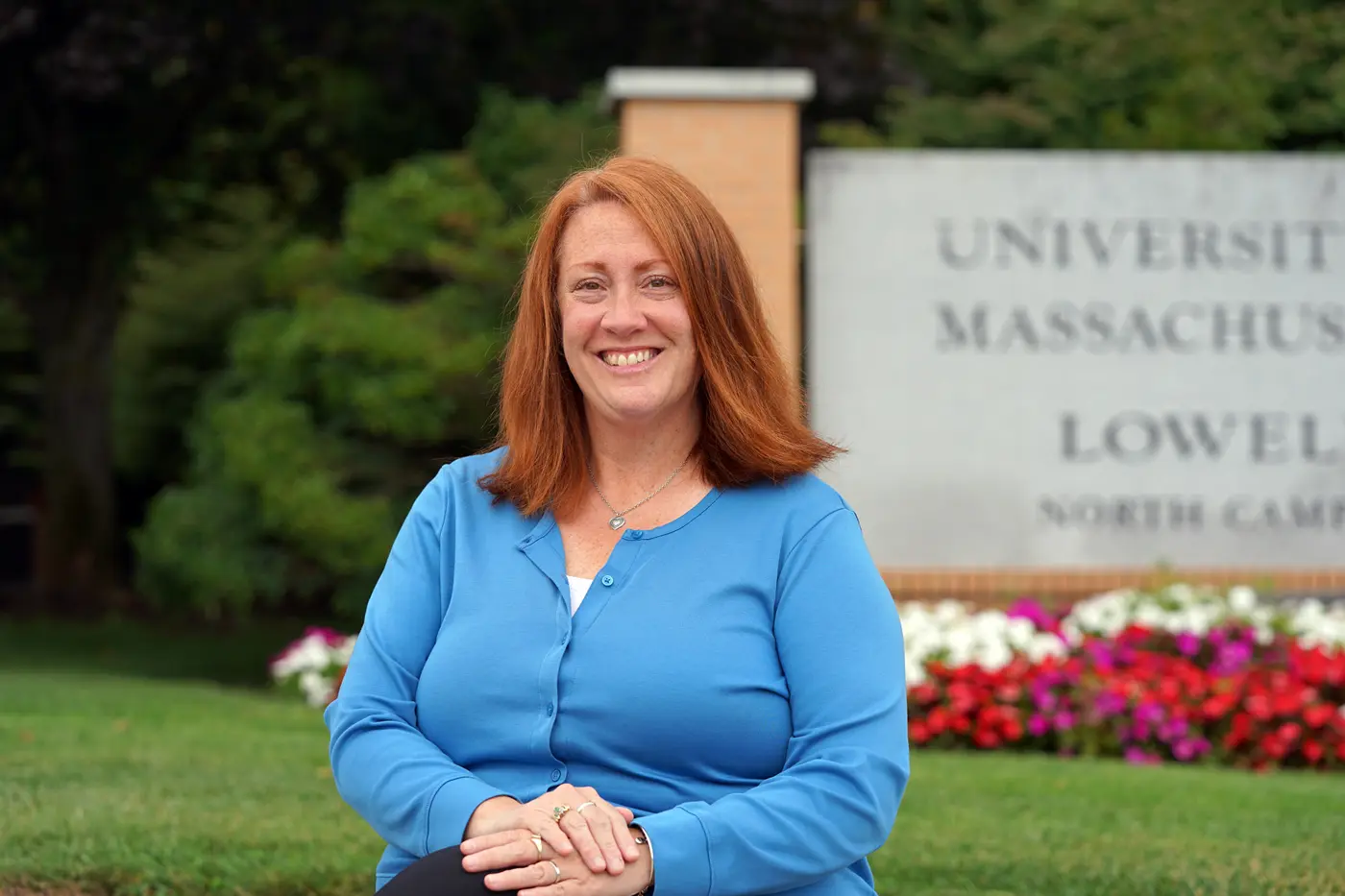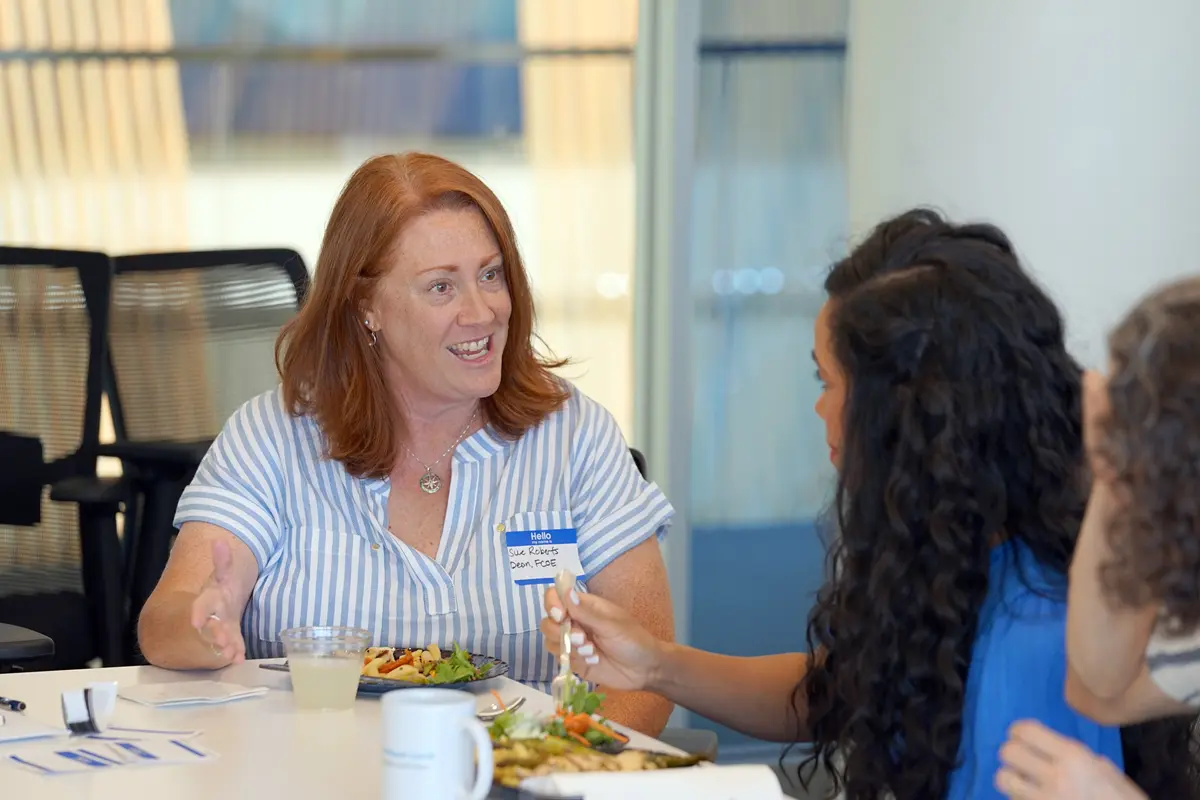 Image by Ed Brennen
Image by Ed Brennen
New Francis College of Engineering Dean Susan Roberts joins UMass Lowell after a decade at Worcester Polytechnic Institute and 17 years at UMass Amherst.
As a chemical engineer, Susan Roberts is “inspired by the ability of nature, in particular plant systems, to adapt and respond to stresses to enable both survival and growth.”
As the new dean of UMass Lowell’s Francis College of Engineering, Roberts can see a parallel to the world of higher education, which is rapidly evolving and adapting to a host of stressors and changes.
Roberts is optimistic about rising to the challenges as she settles into her new job.
“In the short time I’ve been here, I’ve learned that the people are incredible,” says Roberts, who joined the university in August. “They are dedicated to the students and to moving the university forward in new ways, and I’m so excited to be here.”
A native of Billerica, Roberts is a first-generation college graduate who earned a bachelor’s degree in chemical engineering from Worcester Polytechnic Institute (WPI) and a Ph.D. from Cornell University.
She spent 17 years on the faculty at UMass Amherst, where she founded the Institute for Cellular Engineering, developed pioneering interdisciplinary graduate programs and served as associate dean of the graduate school. In a decade at WPI, she elevated the research profile and funding for the chemical engineering department while tripling the size of its graduate program.
Now, Roberts becomes the first woman to lead the College of Engineering — at an important moment. With UMass Lowell’s recent Carnegie Research 1 (R1) designation and the launch of the Lowell Innovation Network Corridor (LINC), Roberts sees an opportunity to elevate the college’s reputation, strengthen its community and expand opportunities for students, faculty and alumni.
“I love research and discovery, but I want people to do it in a way that makes them excited and satisfied with their careers, where they can be innovative and inspired,” says Roberts, who sat down to discuss her new role and her plans for the College of Engineering.
What attracted you to the position?
Being part of a new R1 university was a huge draw. I’m excited about sustaining and growing the research enterprise in the College of Engineering, while also working with initiatives like LINC. My whole career has been built on interdisciplinarity — bringing together engineering and the life sciences — and I see enormous potential here to collaborate across colleges. I’ve already started meeting with other deans in science, business and health, because I think the most pressing problems we face today will only be solved when we bring together people from different perspectives. Another thing that attracted me was the diverse student body — the fact that 40% of the students are first-gen and 40% of the students are students of color. I've never been in an environment like that, so I’m excited, and I can't wait to meet the students.
How did you land on a career that bridges engineering and life sciences?
When I graduated from high school, I thought I was going to become a doctor. I went to WPI because I was interested in STEM, but I discovered chemical engineering and became excited about understanding molecular mechanisms and building entire systems and processes from that knowledge. Pretty quickly, I realized I was more excited about research than medicine. With the help of mentors and some amazing project-based experiences, I shifted my path from pre-med to pursuing a Ph.D. and a career as a professor. At Cornell, I worked with a tremendous advisor who was really the founder of biochemical engineering, and I learned about the interface of engineering and life sciences.
At UMass Amherst, you were the first female member of the chemical engineering faculty. At WPI, you were the first female engineering department head. And now at UMass Lowell, you are the first female engineering dean. What does that mean to you?
Being a first-gen college student, and being the first woman in pretty much every position I've ever been in, I bring a different perspective. I've really come to value bringing together people from different backgrounds to provide their perspectives. I learn from pretty much everyone I meet, and I think bringing people in who have had different experiences really helps grow whatever you're doing. I want people to feel like we’re a college that is inclusive and that really wants people here. It’s a core value of mine and a core value of the university, which is something that drew me to the position.
 Image by Ed Brennen
Image by Ed Brennen
New Francis College of Engineering Dean Susan Roberts, left, chats with Biomedical Engineering Professor Lara Thompson during a recent luncheon for new UML faculty members at University Crossing.
How does artificial intelligence (AI) fit into engineering education and research?
I’m excited about the potential of AI, and I think it’s essential that we integrate it into our curriculum and research. I’ve tasked Associate Dean of Undergraduate Affairs Kavitha Chandra with putting together a working group this fall to think about this. There needs to be some basic faculty training in AI so they understand the tools that are available; I know I want to get more training myself. I would encourage my faculty to use AI as a positive tool in the classroom, and to have students explore the use of AI in different modalities. Of course, we need to address the risks, like plagiarism or misinformation, but I see AI as a powerful tool that can make our work more efficient and creative as long as we keep a strong human eye on it. I’m also eager to connect with our engineering faculty doing cutting-edge AI and machine learning research, because what they’re building for industry will inform how we prepare students for the future.
What are some of your other early priorities as dean?
We’re going to go through a strategic planning process. I want people to really think about where their departments and programs are with undergraduates, graduates, research, staffing, facilities — all of that. I’m going to be doing a lot of listening and learning this year, although I don't want to just sit back and not make any decisions on new paths forward, because you want to keep forging ahead in promising areas. We have a lot of great core facilities that support research, but I think there are physical spaces for undergraduates that we need to develop as well. I want to bring joy to the college. I want faculty, staff and students to feel like they're part of a team, part of a community and that they feel valued. I know I work harder and am more satisfied when I feel valued. So I want to build community in the college this year.
What excites you most about returning to the Merrimack Valley?
Growing up in Billerica, I’ve always felt connected to Lowell. I used to go to events at the Tsongas Center probably before it was even called the Tsongas Center. So coming back to this community, that's another thing that drew me to the position. The College of Engineering has the ability to raise up the community through its connection to industry and as one of the leaders in developing LINC, and I’m really excited about that, especially since I grew up in this area.
